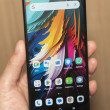Review: Kyocera Echo
The Kyocera Echo is a pretty big departure when it comes to handset design. It has two displays that, when unfolded, join to form one, massive, tablet-esque 4.7-inch display. If that's too much screen action for you to handle, it can also be used with only one of the two 3.5-inch displays visible, or with the displays angled laptop-style. The Echo essentially provides three different physical modes of operation. In order to do this, Kyocera had to make some interesting design choices.
First, the Echo is insanely thick when all closed up. At 17mm/0.68 inches, it is thicker than my laptop. Second, in order to get the screens to fit snugly together with as little bezel between them as possible, the Echo is rectangular to a fault. It's literally shoe-box shaped, and has hard corners and 90-degree angles. Third, it is ugly as sin. It looks more like a prototype from the 90s than anything that's hitting the market in 2011. Everything about its design is industrial and unfriendly.
It really does feel like holding a brick. With its hard angles, sharp edges, thick waistline and hefty weight, I found it uncomfortable to use. Pocket friendly? No way in hell. When put in even a loose front pocket, it can be painful when caught the wrong way (such as when getting into/out of cars). As for overall build quality, the plastics feel cheap, but the fit and finish is decent.
The hinge system is interesting. If you're worried about its strength and dependability, don't. It is tough as nails. Kyocera engineered it for strength. In order to get the Echo open, grab either side (doesn't really matter which) of the top half of the device and pull up. Once you get it up about an inch, the springs take over and snap it into what Sprint refers to as "Simul-Task" mode.
In Simul-Task mode, the Echo positions the two screens at about a 30-degree angle for easier viewing and typing. The assumption is that you'll hold the Echo sideways when in Simul-Task mode.
If you want to put the Echo in tablet mode, simply push the top half down until it is even with the bottom half and then push them together until it snaps into place. It's a loud, clacky process; you'll figure it out by sound. With the Echo in tablet mode, it is a large, pancake-sized slab of technology that has a 4.7-inch display. You can hold in in any orientation you wish; it doesn't really matter. Really what you need to decide is: do you like the black bar - where the two displays meet in the middle - running up and down, or from side to side? For me, side to side was preferable.
Holding the Echo in tablet mode is pretty comfortable. The hinge on the back creates a natural grip point for your fingers, letting you grip it tightly without stretching your hand across its 4.35-inch width. Obviously, it is also much thinner. The weight is balanced, with your thumbs have easy access to the entire display.
As for the rest of the controls, they are all positioned on the left side of the Echo (or the bottom when in Simul-Task mode). There is a 3.5mm headset jack, a hatch covering the microSD card port, the power/lock key, volume toggle, and finally microUSB port. Both the microSD and microUSB ports are easy to get at, and the soft plastic hatches present no obstacle. I don't know about you, but I like the power/like key to be on the top of the device, not on the side, and especially not on the LEFT side of the device. It will take a lot of muscle memory training for me to get used to. It is a bit small, but has great travel and feedback. The volume toggle is also too small, but offers great travel and feedback.
Don't take any of this to mean that I hate the Echo. I don't. I absolutely get it and its use case. I simply feel alienated by the hardware.


















 Hands-On: Kyocera Echo
Hands-On: Kyocera Echo
 Kyocera Echo Sports Two Displays, Hinged Design
Kyocera Echo Sports Two Displays, Hinged Design
 Kyocera Echo
Kyocera Echo



